Xin Cong
MiniCPM4: Ultra-Efficient LLMs on End Devices
Jun 09, 2025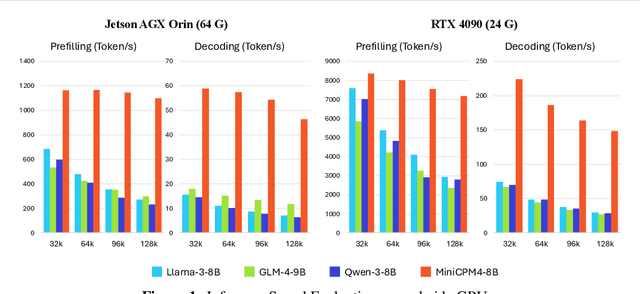

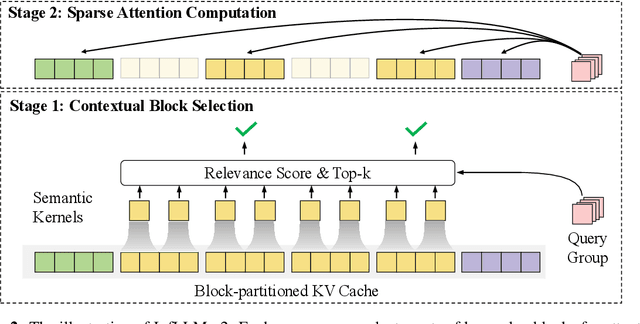
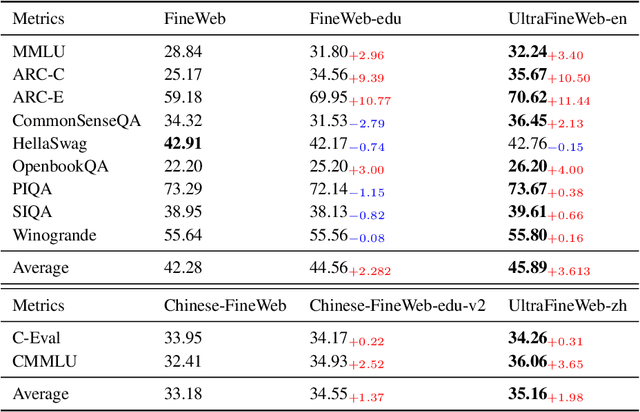
Abstract:This paper introduces MiniCPM4, a highly efficient large language model (LLM) designed explicitly for end-side devices. We achieve this efficiency through systematic innovation in four key dimensions: model architecture, training data, training algorithms, and inference systems. Specifically, in terms of model architecture, we propose InfLLM v2, a trainable sparse attention mechanism that accelerates both prefilling and decoding phases for long-context processing. Regarding training data, we propose UltraClean, an efficient and accurate pre-training data filtering and generation strategy, and UltraChat v2, a comprehensive supervised fine-tuning dataset. These datasets enable satisfactory model performance to be achieved using just 8 trillion training tokens. Regarding training algorithms, we propose ModelTunnel v2 for efficient pre-training strategy search, and improve existing post-training methods by introducing chunk-wise rollout for load-balanced reinforcement learning and data-efficient tenary LLM, BitCPM. Regarding inference systems, we propose CPM.cu that integrates sparse attention, model quantization, and speculative sampling to achieve efficient prefilling and decoding. To meet diverse on-device requirements, MiniCPM4 is available in two versions, with 0.5B and 8B parameters, respectively. Sufficient evaluation results show that MiniCPM4 outperforms open-source models of similar size across multiple benchmarks, highlighting both its efficiency and effectiveness. Notably, MiniCPM4-8B demonstrates significant speed improvements over Qwen3-8B when processing long sequences. Through further adaptation, MiniCPM4 successfully powers diverse applications, including trustworthy survey generation and tool use with model context protocol, clearly showcasing its broad usability.
ToLeaP: Rethinking Development of Tool Learning with Large Language Models
May 17, 2025
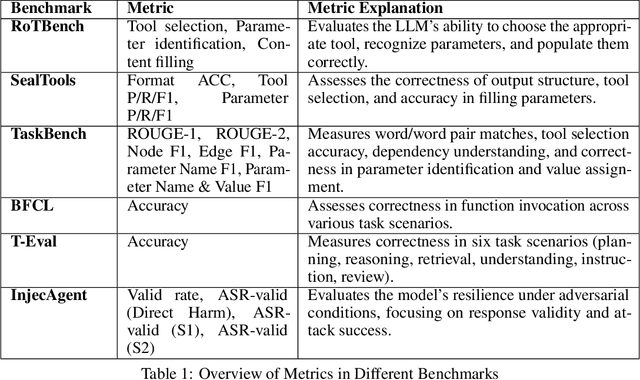

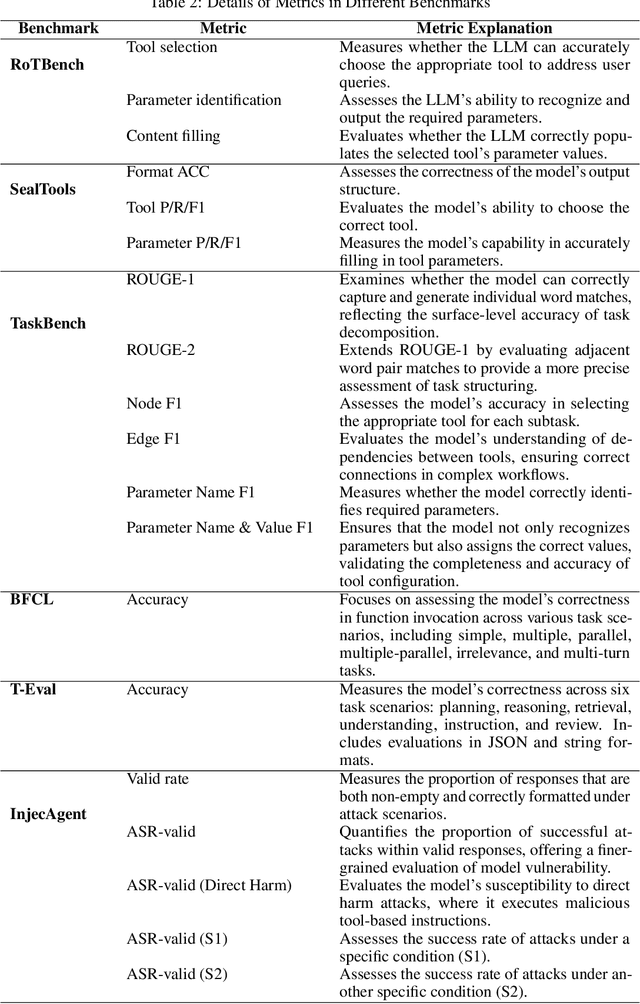
Abstract:Tool learning, which enables large language models (LLMs) to utilize external tools effectively, has garnered increasing attention for its potential to revolutionize productivity across industries. Despite rapid development in tool learning, key challenges and opportunities remain understudied, limiting deeper insights and future advancements. In this paper, we investigate the tool learning ability of 41 prevalent LLMs by reproducing 33 benchmarks and enabling one-click evaluation for seven of them, forming a Tool Learning Platform named ToLeaP. We also collect 21 out of 33 potential training datasets to facilitate future exploration. After analyzing over 3,000 bad cases of 41 LLMs based on ToLeaP, we identify four main critical challenges: (1) benchmark limitations induce both the neglect and lack of (2) autonomous learning, (3) generalization, and (4) long-horizon task-solving capabilities of LLMs. To aid future advancements, we take a step further toward exploring potential directions, namely (1) real-world benchmark construction, (2) compatibility-aware autonomous learning, (3) rationale learning by thinking, and (4) identifying and recalling key clues. The preliminary experiments demonstrate their effectiveness, highlighting the need for further research and exploration.
AC-Reason: Towards Theory-Guided Actual Causality Reasoning with Large Language Models
May 13, 2025Abstract:Actual causality (AC), a fundamental aspect of causal reasoning (CR), is responsible for attribution and responsibility assignment in real-world scenarios. However, existing LLM-based methods lack grounding in formal AC theory, resulting in limited interpretability. Therefore, we propose AC-Reason, a semi-formal reasoning framework that identifies causally relevant events within an AC scenario, infers the values of their formal causal factors (e.g., sufficiency, necessity, and normality), and answers AC queries via a theory-guided algorithm with explanations. While AC-Reason does not explicitly construct a causal graph, it operates over variables in the underlying causal structure to support principled reasoning. To enable comprehensive evaluation, we introduce AC-Bench, a new benchmark built upon and substantially extending Big-Bench Hard Causal Judgment (BBH-CJ). AC-Bench comprises ~1K carefully annotated samples, each with detailed reasoning steps and focuses solely on actual causation. The case study shows that synthesized samples in AC-Bench present greater challenges for LLMs. Extensive experiments on BBH-CJ and AC-Bench show that AC-Reason consistently improves LLM performance over baselines. On BBH-CJ, all tested LLMs surpass the average human rater accuracy of 69.60%, with GPT-4 + AC-Reason achieving 75.04%. On AC-Bench, GPT-4 + AC-Reason again achieves the highest accuracy of 71.82%. AC-Bench further enables fine-grained analysis of reasoning faithfulness, revealing that only Qwen-2.5-72B-Instruct, Claude-3.5-Sonnet, and GPT-4o exhibit faithful reasoning, whereas GPT-4 tends to exploit shortcuts. Finally, our ablation study proves that integrating AC theory into LLMs is highly effective, with the proposed algorithm contributing the most significant performance gains.
Learning to Generate Structured Output with Schema Reinforcement Learning
Feb 26, 2025Abstract:This study investigates the structured generation capabilities of large language models (LLMs), focusing on producing valid JSON outputs against a given schema. Despite the widespread use of JSON in integrating language models with programs, there is a lack of comprehensive analysis and benchmarking of these capabilities. We explore various aspects of JSON generation, such as structure understanding, escaping, and natural language description, to determine how to assess and enable LLMs to generate valid responses. Building upon this, we propose SchemaBench features around 40K different JSON schemas to obtain and assess models' abilities in generating valid JSON. We find that the latest LLMs are still struggling to generate a valid JSON string. Moreover, we demonstrate that incorporating reinforcement learning with a Fine-grained Schema Validator can further enhance models' understanding of JSON schema, leading to improved performance. Our models demonstrate significant improvement in both generating JSON outputs and downstream tasks.
AgentRM: Enhancing Agent Generalization with Reward Modeling
Feb 25, 2025Abstract:Existing LLM-based agents have achieved strong performance on held-in tasks, but their generalizability to unseen tasks remains poor. Hence, some recent work focus on fine-tuning the policy model with more diverse tasks to improve the generalizability. In this work, we find that finetuning a reward model to guide the policy model is more robust than directly finetuning the policy model. Based on this finding, we propose AgentRM, a generalizable reward model, to guide the policy model for effective test-time search. We comprehensively investigate three approaches to construct the reward model, including explicit reward modeling, implicit reward modeling and LLM-as-a-judge. We then use AgentRM to guide the answer generation with Best-of-N sampling and step-level beam search. On four types of nine agent tasks, AgentRM enhances the base policy model by $8.8$ points on average, surpassing the top general agent by $4.0$. Moreover, it demonstrates weak-to-strong generalization, yielding greater improvement of $12.6$ on LLaMA-3-70B policy model. As for the specializability, AgentRM can also boost a finetuned policy model and outperform the top specialized agent by $11.4$ on three held-in tasks. Further analysis verifies its effectiveness in test-time scaling. Codes will be released to facilitate the research in this area.
Exploring LLM-based Student Simulation for Metacognitive Cultivation
Feb 17, 2025



Abstract:Metacognitive education plays a crucial role in cultivating students' self-regulation and reflective thinking, providing essential support for those with learning difficulties through academic advising. Simulating students with insufficient learning capabilities using large language models offers a promising approach to refining pedagogical methods without ethical concerns. However, existing simulations often fail to authentically represent students' learning struggles and face challenges in evaluation due to the lack of reliable metrics and ethical constraints in data collection. To address these issues, we propose a pipeline for automatically generating and filtering high-quality simulated student agents. Our approach leverages a two-round automated scoring system validated by human experts and employs a score propagation module to obtain more consistent scores across the student graph. Experimental results demonstrate that our pipeline efficiently identifies high-quality student agents, and we discuss the traits that influence the simulation's effectiveness. By simulating students with varying degrees of learning difficulties, our work paves the way for broader applications in personalized learning and educational assessment.
WorkflowLLM: Enhancing Workflow Orchestration Capability of Large Language Models
Nov 08, 2024Abstract:Recent advancements in large language models (LLMs) have driven a revolutionary paradigm shift in process automation from Robotic Process Automation to Agentic Process Automation by automating the workflow orchestration procedure based on LLMs. However, existing LLMs (even the advanced OpenAI GPT-4o) are confined to achieving satisfactory capability in workflow orchestration. To address this limitation, we present WorkflowLLM, a data-centric framework elaborately designed to enhance the capability of LLMs in workflow orchestration. It first constructs a large-scale fine-tuning dataset WorkflowBench with 106,763 samples, covering 1,503 APIs from 83 applications across 28 categories. Specifically, the construction process can be divided into three phases: (1) Data Collection: we collect real-world workflow data from Apple Shortcuts and RoutineHub, transcribing them into Python-style code. We further equip them with generated hierarchical thought via ChatGPT. (2) Query Expansion: we prompt ChatGPT to generate more task queries to enrich the diversity and complexity of workflows. (3) Workflow Generation: we leverage an annotator model trained on collected data to generate workflows for synthesized queries. Finally, we merge the synthetic samples that pass quality confirmation with the collected samples to obtain the WorkflowBench. Based on WorkflowBench, we fine-tune Llama-3.1-8B to obtain WorkflowLlama. Our experiments show that WorkflowLlama demonstrates a strong capacity to orchestrate complex workflows, while also achieving notable generalization performance on previously unseen APIs. Additionally, WorkflowBench exhibits robust zero-shot generalization capabilities on an out-of-distribution task planning dataset, T-Eval. Our data and code are available at https://github.com/OpenBMB/WorkflowLLM.
Distance between Relevant Information Pieces Causes Bias in Long-Context LLMs
Oct 18, 2024



Abstract:Positional bias in large language models (LLMs) hinders their ability to effectively process long inputs. A prominent example is the "lost in the middle" phenomenon, where LLMs struggle to utilize relevant information situated in the middle of the input. While prior research primarily focuses on single pieces of relevant information, real-world applications often involve multiple relevant information pieces. To bridge this gap, we present LongPiBench, a benchmark designed to assess positional bias involving multiple pieces of relevant information. Thorough experiments are conducted with five commercial and six open-source models. These experiments reveal that while most current models are robust against the "lost in the middle" issue, there exist significant biases related to the spacing of relevant information pieces. These findings highlight the importance of evaluating and reducing positional biases to advance LLM's capabilities.
Proactive Agent: Shifting LLM Agents from Reactive Responses to Active Assistance
Oct 16, 2024



Abstract:Agents powered by large language models have shown remarkable abilities in solving complex tasks. However, most agent systems remain reactive, limiting their effectiveness in scenarios requiring foresight and autonomous decision-making. In this paper, we tackle the challenge of developing proactive agents capable of anticipating and initiating tasks without explicit human instructions. We propose a novel data-driven approach for this problem. Firstly, we collect real-world human activities to generate proactive task predictions. These predictions are then labeled by human annotators as either accepted or rejected. The labeled data is used to train a reward model that simulates human judgment and serves as an automatic evaluator of the proactiveness of LLM agents. Building on this, we develop a comprehensive data generation pipeline to create a diverse dataset, ProactiveBench, containing 6,790 events. Finally, we demonstrate that fine-tuning models with the proposed ProactiveBench can significantly elicit the proactiveness of LLM agents. Experimental results show that our fine-tuned model achieves an F1-Score of 66.47% in proactively offering assistance, outperforming all open-source and close-source models. These results highlight the potential of our method in creating more proactive and effective agent systems, paving the way for future advancements in human-agent collaboration.
Learning Evolving Tools for Large Language Models
Oct 09, 2024



Abstract:Tool learning enables large language models (LLMs) to interact with external tools and APIs, greatly expanding the application scope of LLMs. However, due to the dynamic nature of external environments, these tools and APIs may become outdated over time, preventing LLMs from correctly invoking tools. Existing research primarily focuses on static environments and overlooks this issue, limiting the adaptability of LLMs in real-world applications. In this paper, we propose ToolEVO, a novel framework designed to enhance the adaptive and reflective capabilities of LLMs against tool variability. By leveraging Monte Carlo Tree Search, ToolEVO facilitates active exploration and interaction of LLMs within dynamic environments, allowing for autonomous self-reflection and self-updating of tool usage based on environmental feedback. Additionally, we introduce ToolQA-D, a benchmark specifically designed to evaluate the impact of tool variability. Extensive experiments demonstrate the effectiveness and stability of our approach, highlighting the importance of adaptability to tool variability for effective tool learning.
 Add to Chrome
Add to Chrome Add to Firefox
Add to Firefox Add to Edge
Add to Edge